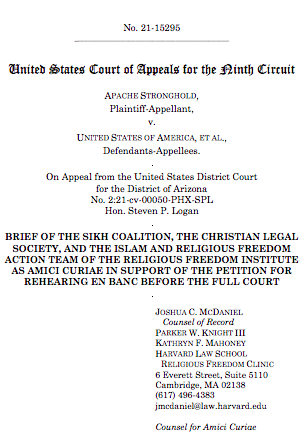Summary of facts: In 2014, Congress ordered the transfer of an Apache worship site in Arizona to a multinational mining corporation seeking to turn the land into a copper mine. The Apache sued, arguing that the federal government’s transfer of the land was a substantial burden on their religious exercise under the Religious Freedom Restoration Act (RFRA). A 3-judge panel of the US Court of Appeals for the Ninth Circuit ruled against the Apache, holding that the destruction of a sacred worship site does not constitute a “substantial burden” under its interpretation of RFRA. The Ninth Circuit then agreed to rehear the case under “limited en banc review,” meaning a panel of eleven appellate court judges. That panel again ruled against the Apache, who are now asking for “full en banc review” of their case by all twenty-nine of the circuit’s judges.
RFI’s position: The Supreme Court has repeatedly affirmed RFRA as a robust bulwark for religious liberty. Neither the text nor the intent of RFRA support the limited en banc Ninth Circuit’s radically cabined interpretation of the statute’s “substantial burden” element. Demolishing a worship site is self-evidently a substantial burden on religious exercise. The full en banc Ninth Circuit should reverse.
Read the amicus brief here.
THE RFI BLOG

Does Southeast Asia Lead the World in Human Flourishing?

RFI Leads Training Session on Religious Freedom Law and Policy for U.S. Army War College

Oral Argument in Charter School Case Highlights Unconstitutional Motives Behind OK Attorney General’s Establishment Clause Claim

Largest Longitudinal Study of Human Flourishing Ever Shows Religion’s Importance

Keys To Human Flourishing: Faith And Relationships Outweigh Wealth
CORNERSTONE FORUM

Reaffirming Religious Freedom: Bridging U.S. Advocacy and Iraq’s Constitutional Framework

Political Polarization, Same-Sex Marriage and Religious Liberty

Bridging the Gap Between International Efforts and Local Realities: Advancing Religious Freedom in the MENA Region

Challenges to Religious Freedom in Iraq and the Critical Need for Action


